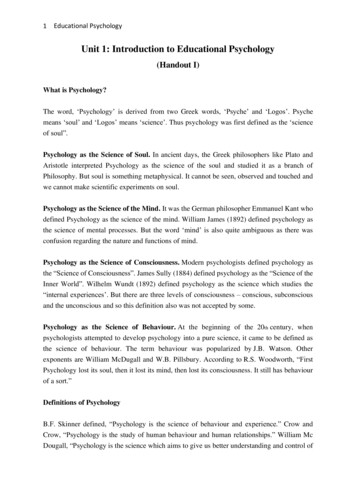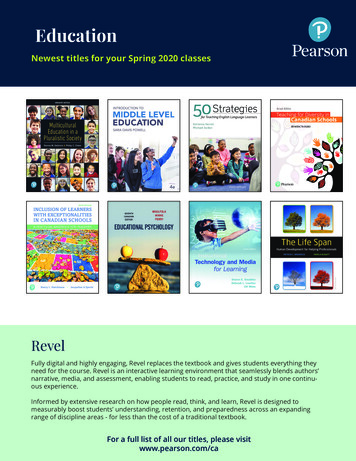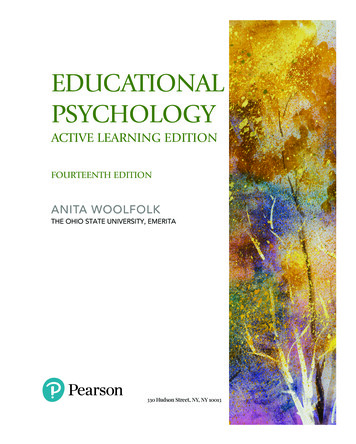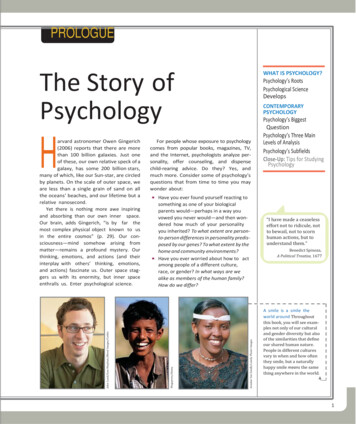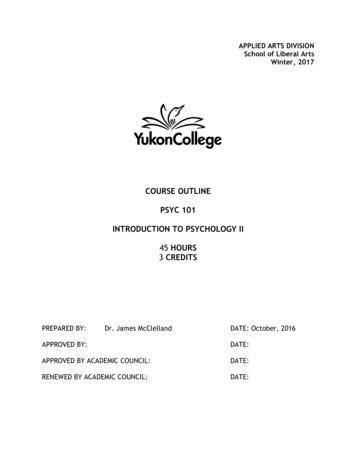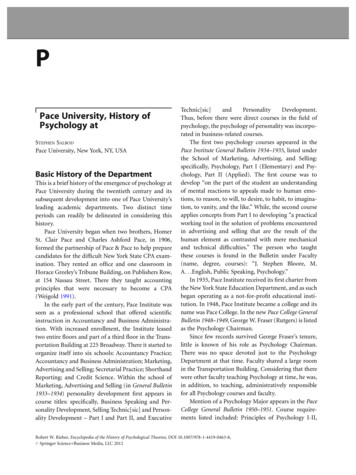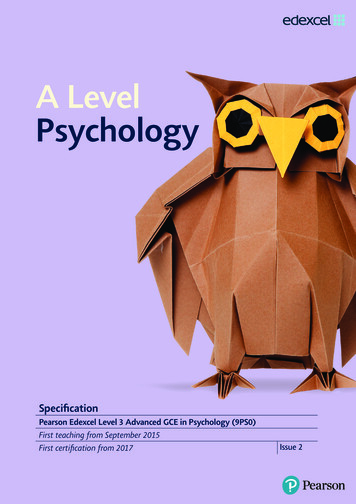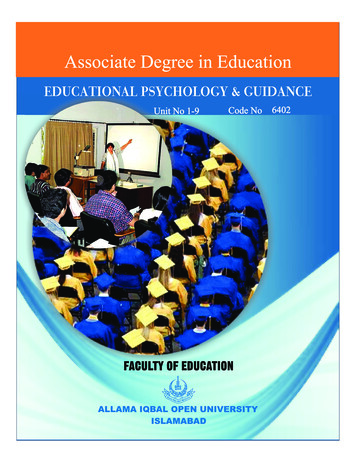
Transcription
EDUCATIONAL PSYCHOLOGYAND GUIDANCECode: 6402Units: 1–9Department of EducationAllama Iqbal Open University Islamabad
(All Rights Reserved with the Publisher)First Printing . 2012Quantity .Price .Composed by . Muhammad Hameed ZahidPrinting Coordinator: . Printing Press Operations CommitteePrinter. AIOU-Printing Press, H-8, Islamabad.Publisher . Allama Iqbal Open University, Islamabad.ii
FOREWORDPsychology is the scientific study of human behaviour and mental processes.Educational Psychology is a specialized area of psychology which mainly focuseson understanding teaching and learning in educational settings. The field ofeducational psychology was founded by several pioneers in psychology justbefore the beginning of twentieth century. Over the period of past twelve decades,“Educational Psychology” has emerged as developing science — a body ofknowledge of its own concepts, theories and practices constructed on applicationsof psychology to effectively educate children.The major objectives of educational psychology are the scientific underpinnings,understanding and improving the processes of teaching. Having a soundknowledge of psychology is essential for educationalists and teachers to achievethe above narrated objectives of educational psychology. Educational psychologyis a vital subject of study for students and teachers of education. Educationalpsychology is a critical foundation of becoming a competent teacher to impartquality education to children. The theoretical corpus of educational psychology — itsconcepts, theories and principles are the main tools and techniques that helpeducationalists/teachers select the most effective teaching strategy and createconducive teaching environment to make the overall process of learning thoughtprovoking, interesting and productive.In considering the importance and vitality of educational psychology for teachingand learning processes, “Educational Psychology and Guidance” is offered as afoundation course for ADE and four year B.Ed programs. This book oneducational psychology and guidance written by the team of eminentPsychologists and teachers is intensively reviewed and revised. This is aninvaluable source of information in the field of educational psychology, foreducationists, teachers and students, to equally benefit from it.The sincere efforts, dedication and the professional contribution of the Dean,Faculty of Education and his team really deserve appreciation and congratulationon production of this valuable book.Vice Chancelloriii
COURSE TEAMChairman:Dr. M. Zafar IqbalCourse Development Coordinator:S. M. ShahidWriters:Attaullah JosephAbbasa ManzoorS. M. ShahidFarah Naz QasmiGulab KhanIshaq Shahid AminDr. Mumtaz Fatima JaffriReviewers:Dr. Irshad AhmedAmir BanoEditor:Waqar SultanCourse Coordinator:Amir Banoiv
CONTENTSPage #Foreword .iiiIntroduction of the Course .viObjectives of the Course .viiAcknowledgement . viiiUnit–1: Introduction to Educational Psychology .1Unit–2: Human Growth and Development .25Unit–3: Teaching Learning Process .63Unit–4: Theories of Learning .99Unit–5: Motivation . 111Unit–6: Individual Differences . 141Unit–7: Mental Health. 169Unit–8: Guidance in School . 205Unit–9: Counselling . 229v
INTRODUCTION OF THE COURSEPsychology is an academic and applied field involving the study of behaviour, mind andthought and the subconscious neurological bases of behaviour. Psychology also refers tothe application of such knowledge to various spheres of human activity, includingproblems of individuals, daily lives and the treatment of mental illness.Educational psychology is the psychology that relates to education. It is the scientificstudy of human behaviour in educational situations. Educational psychology is thatscience which helps to provide a better background for understanding the total job ofteaching in all its intricacies.Educational psychology is an applied branch of psychology. It applies psychologicalprinciples and techniques to human behaviour in educational situation, to thedevelopment of educational strategies and programs and further to the solutions ofeducational problems.Effort has been made regarding the course to highlight all the important aspects ofeducational psychology. Unit-1 provides the meaning and nature of psychology andEducational Psychology. It further clarifies that how the educational psychology hasrelevance for the classroom teacher in a number of ways. Unit-2 reveals the informationregarding human development, particularly from childhood to adolescence. Unit-3 & 4highlights the meaning, nature of learning and the role of Associative and Cognitivetheories in learning processes.Unit-5, deals with the concept of motivation, its different theories. It further discusses therole of teacher enhancing, student’s motivation. Areas of individual differences, causes ofindividual difference and measurement of individual differences are discussed in Unit-6.Unit-7 describes the concept of mental health, adjustment mechanism and mental healthin school and home. Unit-8 provides the concept of guidance modes and its importance inschool and educational organizations. The last unit elaborates the nature of counsellingand different therapies of counselling.However, the course of Educational Psychology and Guidance is meant to remain openended. The course will be revised after in due course of time and all suggestions/recommendations and improvement will be considered for incorporation.(Mrs. Amir Bano)Assistant Professorvi
OBJECTIVES OF THE COURSEHopefully, on completion of the course, the student will be able to:1.Explain the significance, scope and role of Educational Psychology.2.Describe the main stages of development (Cognitive, Social, Moral and Emotionalwith the help of different theories)3.Define the term learning and differentiate between associative and cognitivetheories of learning.4.Identify the cause of individual differences.5.Explain the concept of Mental Health.6.Describe the need and characteristics of guidance and counselling process.vii
ACKNOWLEDGEMENTThe Allama Iqbal Open University and the undersigned in capacity of DeanFaculty of Education is grateful to all scholars nationally and internationally andthe publishers of various books, reports, and journals whose work were used asreference material in this course. The quotations used from their works aregratefully acknowledged.I am grateful to Prof. Dr. Nazir Ahmed Sangi, Vice-Chancellor, Allama IqbalOpen University, for providing facilities, encouragement and inestimablecontributions throughout the revision of this course.It will be injustice if I do not acknowledge the efforts of Mrs. Amir Bano (ADEProgram Coordinator) who revised this course provided feedback and fresh ideasin respect of its development.Finally, thanks are due to all those who helped in developing the course.(Prof. Dr. Tanveer-uz-Zaman)Dean, Faculty of Educationviii
Unit–1INTRODUCTION TO PSYCHOLOGYWritten By: Attaullah JosephReviewed By: Amir Bano
CONTENTSIntroduction .4Objective .41.Meaning and Nature of Psychology .51.1Definition of Psychology .51.2Psychology and Other Sciences .81.3Summary .81.4Self-Assessment Questions .92.Meaning and Nature of Educational Psychology .92.1An Overview .92.2Definition of Educational Psychology .102.3Scope of Educational Psychology .112.4Summary .142.5Self-Assessment Questions .143.Role of Educational Psychology in Teaching – Learning Process .153.1Understanding the Learner .153.2Understanding Instructional Problems .153.3Understanding Educational Process .153.4Self-Understanding as a Teacher.163.5Summary .173.6Self-Assessment Questions .174.Methods of Educational Psychology .174.1The Separation of Disciplines .184.2The Correlation Method .184.3Science for Psychology .192
4.4Scientific Method .204.5Different Strategies of Knowing .214.6Summary .224.7Self-Assessment Questions .23Bibliography .243
INTRODUCTIONThis unit has been written as an introductory text for ADE program studying throughnon-formal system. We have tried to write it in the simplest possible form. The centralaim of the unit is to introduce teachers and students to elementary ideas in psychology,which have some relevance for their work with young people. In addition to drawing onmy own experience in teaching and teacher training, we have benefited greatly from thepublisher’s findings in writing the unit. We have deliberately started with a chapterintroducing the meaning and nature of psychology in educational setting. The mainemphasis is laid on explaining the contribution of educational psychology to enhanceeffectiveness of teaching – learning process. Growth in application of psychologicalprinciples to educational problems has become rapid and diverse in recent years. Newand illuminating concepts have been added to impart maximum knowledge to thestudents of education about psychology, which is the youngest science. The unit hasseveral special features, which we hope will appeal to students and teachers. We alsohope that the students will get personal satisfaction from knowledge of psychology bothas a discipline and as a means of exploring his own qualities as a person as well as apotential teacher.OBJECTIVESAfter studying this unit, you would be able to:1.Elaborate the meaning and nature of psychology.2.Differentiate between psychology and other sciences.3.Differentiate between definitions of psychology by prominent psychologists.4.Define educational psychology.5.Narrate influence of educational psychology on student- behavior.6.Discuss importance of educational psychology for a teacher7.Use of educational psychology in teaching, learning process.8.Explain educational psychology – contribution to enhancement of teaching –learning process - effectiveness.4
1.MEANING AND NATURE OF PSYCHOLOGYThe word “psychology” is derived from two Greek words, psyche (soul) and logos(study). So psychology literally means a “study about soul”. But although the literalmeaning of the word “logos” is “talk” it is commonly used to mean “science”. Hencepsychology literally means the science of soul. But why do we prefer to call psychology ascience and not a talk? The reason is that a talk is usually muddled, vague andfragmentary. For example your talk with a friend on a subject, might have been quiteclear and consistent, yet it could not possibly be as systematic and exhaustive as thescience of that subject can be.Psychology is an academic and applied discipline which deals with study of humanbehavior and mental process. It explains the subconscious neurological basis of behavior.It is the study of mind, thoughts and actions of individuals. It does not necessarily refer tobrain or nervous system and can be purely framed in terms of phenomenological orinformation processing theories of mind. An understanding of brain function is beingincluded in psychological theory and practices, particularly in artificial intelligenceneuropsychological and cognitive neuroscience psychology attempts to explainconsciousness behavior and social interaction. Psychology has been examining therelationship between consciousness, brain and nervous system. Theories of psychologyare applicable to various activities and problems related to individual’s daily life andtreatment of mental illness.1.1 Definition of PsychologyPsychology is the study of the thoughts and actions of individuals. Psychology is theyoungest of all the sciences. It is still in making and is far from being established in thesense in which other sciences are. Hence the definition of psychology has been, andprobably still is, a matter of fierce controversy among psychologists. The largely differfrom one another as indeed all scientists do, in the early stages of their sciencesdisagreements and controversies are almost inevitable and without the, perhaps scientificprogress could not have been as great as it is. This is especially true of a young sciencelike psychology, recently set free from psychology, philosophy, and not alwaysdistinguishable from physiology. As no one definition is agreed upon by commonconsent, there exist different definitions of psychology. It has been variously defined asthe science of soul, the science of mind, the science of consciousness and the science ofbehavior. Let us examine these definitions one by one and see if any of them can enableus to understand accurately what psychology is and what it deals with.1.1.1 Psychology as a Science of SoulAccording to dictionary, psychology means “The science of soul” This is the oldestdefinition of psychology. The word “soul” is a very unsatisfactory term in psychology. Ithas changed its meaning. Aristotle used it for the living principal in all animate beings,but at the present day it is a term used in religion, for that part of us which is immortal5
and which has special relation with God. Thus the use of the term “soul” implies certaintheories of religion with regard to immortality and relationship to God, and such theoriesare just what we want to avoid in science of psychology, even though we may believethem to be true on other grounds.Psychologists are not opposed to religion, but they certainly want to keep this youngscience free from religious terminology. “Soul” is a word of bad door to men of science,smelling too much of religion. As it has a religious flavor, it is unwelcome to modernpsychology. If psychology aspires to be a science-and surely it does-it must adopt ascientific and not a speculative procedure. Science observes facts, and soul is not open toobservation or experiment: The definition of psychology as the science of soul is,therefore, rejected as unscientific.1.1.2 Psychology as the Science of MindTo many, the word “Mind” is quite as vague as the word “soul”. If “Mind” meanssomething mysterious inside us, it would be just the same as should, and this definition too,would deserve to be discredited. Ask the man in the street what he means by “Mind” and hewill tell you that is it something in his body, or rather head, which thinks, feels and wills.So if we define psychology as the science of mind as a layman thinks, this definition haveno improvement upon the previous definition of psychology as the science of soul. But likeHume and Titchener, we take mind in the sense of mental process, this definition wouldcertainly be better than the previous one. Psychology would then mean the science ofmental processes. But what are the mental processes? The answer is that they are ourprocesses of knowing, feeling and willing. The processes which are commonly said to goon ‘in’ our mind. Let us illustrate them by example. If a wasp stings my finger, I knowwhat has happened to me, feel a pain, run after the wasp and will to kill it. I know, I feeland I will. The processes of the mind are facts. There are real happenings, and there is nomystery about them. This conception of the mind is sometimes called the empiricalconception, because mental process can be experienced. It is also called the scientificconception because they can be observed and experimented upon.To sum up, the definition of psychology as the science of mental processes seems to bequite reasonable and therefore commands assent. This is subject to one objection,however, according to this definition, psychology is concerned with the study of mentalprocesses. Now, even a superficial consideration shows that a person can study only hisown mental processes. To know the mental process of other persons and animals, one hasto see what they do and “what they do” is called their “behaviour”. I can say that the manis grieved only when I see him weeping. We can know the mental processes of othersonly through the observation of their behaviour.“Thus psychology is concerned with the study of behaviour as well as mentalprocess.”The definition of psychology as the science of mental processes is a half-truth.6
1.1.3 Psychology as the Science of ConsciousnessPsychology has also been defined as the science of consciousness. What isconsciousness? If you stop to reflect, you will be aware that you are sitting on a desk, thatyou are reading a book, and that you are either interested in it or bored by it. The presentawareness is what we mean by consciousness? Does consciousness cover the whole fieldabout mind? The answer is, No. Besides consciousness, mental there are processes andpsychology cannot ignore them because they are also processes of mind the truth rather isthat conscious processes form a very small part of our mind. They are so to speak theupper surface of the deep sea, the greater part of which lies below. Infect, more lies at theback of mind than at its front. This is also incomplete definition because we can study ourown conscious processes; we cannot study mental processes of others. So, we must take“behaviour” into consideration.The definition of psychology as the science of consciousness is too narrow, because itexcludes the study of subconscious and unconscious mental processes and also that ofbehaviour.1.1.4 Psychology as a Science of BehaviourBy ‘behaviour’ is generally understood anything that a living-does. It means “response”,“reactions” or “adjustment’s of an organism to various kinds of stimuli. A stimulus is theoutside cause of mental process. It has already been said that in order to understand theminds of other persons and animals, we have to study their behaviour. Hence psychologyhas been defined as the science of behaviour — a definition that looks harmless enough.This is the most modern of all the definitions and is put forward by the school ofpsychology known as behaviourism, the leading exponent of which is Dr. Watson. Thisschool of psychology, in its extreme form, admits only the study of behaviour as itssubject matter and ignores the study of consciousness and mental processes altogether.Dr. Watson writes: “state of consciousness, like the so called phenomena of spiritualism,are not objectively verifiable and for that reason can never become data for science —“The behaviourist finds no evidence for mental existence or mental processes of anykind.” Again, “consciousness is neither a definable nor a usable concept. It is merelyword for the ‘soul’ of more ancient time.” “If it exists” he continues, “we can knownothing about it.”This point of view has been prevalent in America under the table and aggressiveleadership of Dr. Watson, and has come to be fairly widely held by psychologists in othercountries as well. But although our mind is revealed in our behaviour, yet to studybehaviour at the cost of mind is a mistake. The danger of behaviorism, particularly in itsextreme form, has been its tendency to neglect consciousness and mental processesaltogether.The school of behaviourism is an exaggerated reaction against the purely subjectivestandpoint of those who are known as mentalists subjective standpoint means, the study7
of what goes on in one’s mind. This school has resulted in an equally purely objectivestandpoint. Objective standpoint means the study of what is observable and external tomind (i.e. behaviour). Infect, there can be no objective or external behaviour without thesubjective or inner mental processes of which the former is expression. Hence thisdefinition of psychology as science of behaviour is rejected as one-sided.1.2Psychology and Other SciencesIn Universe, there are found nonliving things (stones, rocks, rivers etc), living thingswithout mind, plants, trees and living things possessing life and mind (human beings &animals).Material things exist at the lowest level whereas living things having no mind exist atlevel higher than the level of existence of material things and the living things possessinglife and mind are at the highest level of existence. The corresponding to these three levelsof existence, there are three categories of sciences to explain them:1.2.1 Physical SciencesThese sciences explain the existence of non-living things. They describe variousproperties of matter and composition of material things. They attempt to understand andexplain physical phenomena in nature.1.2.2 Biological ScienceThese sciences deal with life and living thing. They explain biological phenomena. Theystudy of various forms of life-manifestation. They attempt to discover the conditions andlaws of growth and development of plants, animals and human beings.1.2.3 Mental ScienceThere are various physical sciences and biological sciences. Similarly there are severalsciences which deal with mind. But there is one fundamental science lies at the basis ofmind-sciences which to studies the essential nature of mind how does mind grow andfunction in human beings and animals, in individuals & societies, in normal andabnormal persons. This fundamental science is known as psychology.1.3 SummaryPsychology is the youngest science. It had its formal beginning in Leipzig, Germany.Wilhelm Wudt founded the psychological laboratory in 1879. Psychology is concernedwith the study of behaviour as well as mental process. It has been defined in many waysi.e. science of soul, science of mind, science of conscious and science of behaviour. It iscomposed of two Greek words Psyche and Logos, which means study of soul. It isbecoming more and more complex with the complexity of society. It does not studyhuman beings only it extends to the study of animals, birds, and all creatures possessinglife. It has many branches, it is used in education, commerce, industry, health, andcountless other fields. As psychology is involved in several different fields, psychologistsdo not agree upon one single definition of psychology.8
1.4Self-Assessment Questions1.Define psychology briefly.2.Briefly write four kinds of psychologies.3.Do you agree that psychology is a science of soul?4.Is psychology a science, how?5.Which is the best definition of psychology according to this unit?2. MEANING AND NATURE OF EDUCATIONAL PSYCHOLOGY2.1An OverviewIn the previous section, meaning and nature of psychology are discussed. There are manybranches of psychology. One of them is educational psychology.This branch of psychology is the scientific study of educational problems. Educationalpsychology, as a science consists of theories and principles applicable to teachinglearning process. It provides theoretical knowledge for better understanding of teaching –learning process in within the context of all its complexities and intricacies. In a fewwords educational psychology is a study of learning and teaching process. Educationpsychology is a posture applied social science. The educational psychologists studyindividual’s teachers & taught as a social beings in varying social set-ups and situations.As an applied science, if draws on theories, principles and practices of psychology andconstructs application in the area of education. The educational psychology studies thechild’s behaviour and suggests remedies to improve and to be an effective learner. Thescope of educational psychology is confined to the study of individual’s behaviour withincontext of educational institutional framework.There are several pioneers who laid down the foundation of educational psychologybefore the beginning of 20th century. These pioneers stand out in the early history ofeducational psychology.Soon after launching his first psychology textbook, “Principles of psychology” in 1890,William James (1842-1910) delivered a series of lectures called “Talks to Teacher” anddiscussed the applications of psychology to educate children. James argued thatlaboratory psychology experiments often tell us how to affectively teach children. Heemphasized on importance of observing teaching and learning in classrooms forimproving education.A second major figure in shaping the field of educational Psychology was JohnDewey (1859-1952), who became a driving force in the practical application of9
psychology. Dewey stabilized the first major educational psychology laboratory inthe United States, at the University of Chicago in 1894. Dewey believed that childrenlearn best by doing. The Dewey advocated that education should focus on child as awhole. He laid emphasis on the child’s adaptation to the environment. Deweybelieved that children should not be just narrowly educated in academic topics. Theyshould learn how to think and adapt to a world outside school. Children should learnhow to be reflected problem solvers. Dewey was of a view that all children deserve tohave a competent education. This democratic ideal was not in place at the beginningof Dewey’s career. In the later part of nineteenth century, when quality education wasreserved for small portion of children, especially boys from wealthy families, Deweywas one of the influential psychologist educators who pushed for a competenteducation for all children-girls and boys, as well as children from differentsocioeconomic and ethnic background.A third pioneer was E.L. Thorndike (1874-1949), who initiated an emphasis onassessment and measurement. He promoted the scientific underpinnings of learning.He argued that one of the schooling’s most important tasks is development ofchildren’s reasoning skills. He excelled at doing “exacting scientific studies” ofteaching and learning (Beatty, 1998). Thorndike especially promoted the ideas thateducational psychology must have a scientific base that it should focus strongly onmeasurement.2.2Definition of Educational Psychology1.Dr. Abdul-Hai-Alvi writes in his book “Educational Psychology”, “EducationalPsychology means such education which explains about all those changes whichtake place right from birth till becoming adolescent at various stages ofdevelopment. This knowledge tasks about all good or bad affects which effect upona child’s development, and in the light of this study forms such rules andregulations which are kept in mind during planning and management of the school.Study of human behaviour and inner mental processes are a specific of educationalpsychology.2.Garrison has, defined it in these words, “Educational Psychology is name of thatchange which takes place as a result of social interaction which a child hasdeveloped on the basis of his experience and makes use of these during the processof learning.3.Travees says, Educational Psychology is the name of educational process andaction performed in a scientific manner.4.Asubal has defined educational psychology in the following words, “It is
Psychology is the scientific study of human behaviour and mental processes. Educational Psychology is a specialized area of psychology which mainly focuses . the publishers of various books, reports, and journals whose work were used as . like psychology, recently set free fro

